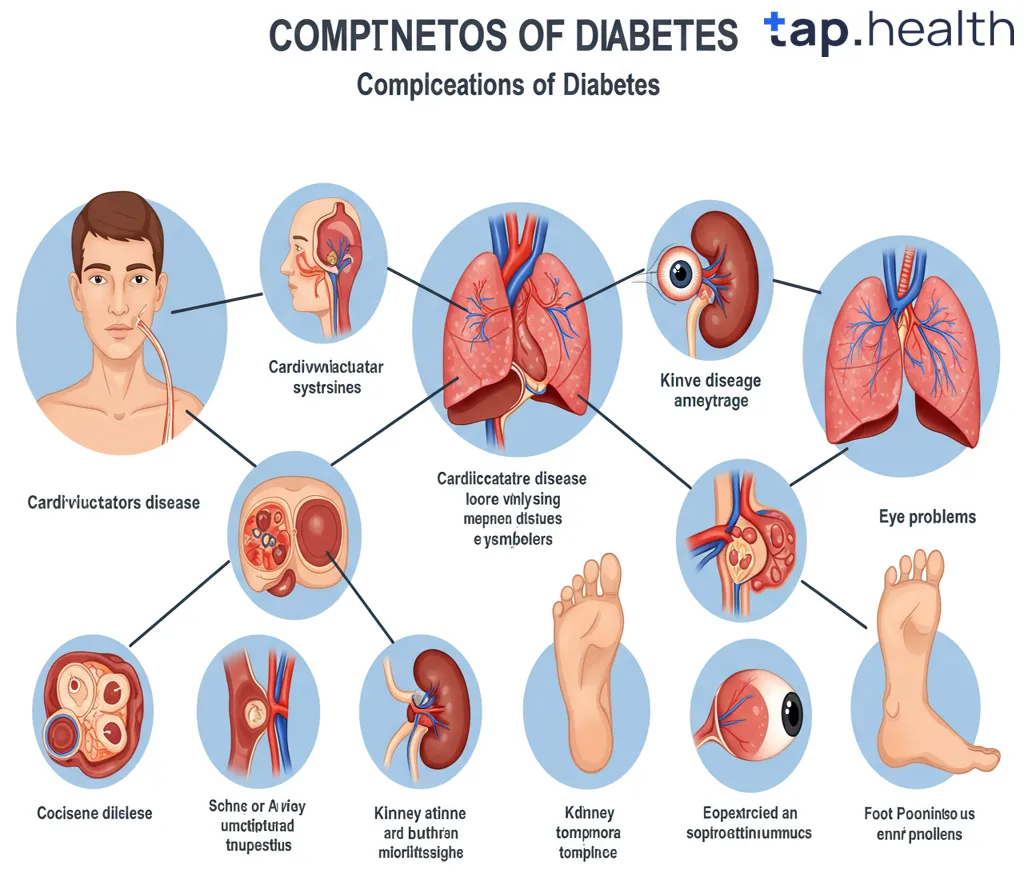Diabetes is a serious condition that affects millions of people worldwide. While it’s important to control blood sugar levels, the disease can still cause many complications over time. Understanding these complications can help you better manage your diabetes and prevent more severe health problems. In this article, we’ll discuss the various complications of diabetes, their causes, and how they can be managed.
What is Diabetes?
Before diving into the complications, it’s important to understand what diabetes is. Diabetes is a condition where the body has difficulty processing sugar (glucose). This happens either because the body doesn’t produce enough insulin (Type 1 diabetes) or the body doesn’t use insulin properly (Type 2 diabetes). Insulin is a hormone that helps regulate blood sugar levels.
When blood sugar levels are consistently high, they can cause long-term damage to the body, leading to complications in various organs and systems. The good news is that many of these complications can be prevented with proper management.
Common Complications of Diabetes
Diabetes affects different parts of the body in various ways. Below are some of the most common complications associated with the condition:
1. Heart Disease and Stroke
People with diabetes are at an increased risk of heart disease and stroke. High blood sugar levels over time can damage blood vessels and nerves, leading to problems with the heart and circulation. This damage can increase the risk of conditions like:
- Atherosclerosis: A condition where the arteries become narrowed and hardened due to plaque buildup.
- Coronary artery disease: A condition that causes reduced blood flow to the heart, leading to chest pain or heart attacks.
- Stroke: A stroke can occur if a blood clot blocks the blood flow to the brain.
The risk of heart disease and stroke is higher for people with diabetes, especially if blood sugar levels are not properly controlled.
2. Kidney Disease (Diabetic Nephropathy)
Diabetes is one of the leading causes of kidney disease. Over time, high blood sugar can damage the kidneys’ filtering system, making it harder for them to remove waste and excess fluids from the body. This condition is called diabetic nephropathy.
If kidney disease is left untreated, it can lead to kidney failure, which may require dialysis or a kidney transplant. Regular checkups and controlling blood sugar levels can help prevent kidney damage.
3. Nerve Damage (Neuropathy)
High blood sugar can also cause nerve damage, a condition known as diabetic neuropathy. This damage can affect nerves in different parts of the body, including the feet, legs, and hands. There are four main types of neuropathy related to diabetes:
- Peripheral neuropathy: This affects the feet and legs, causing tingling, pain, and numbness.
- Autonomic neuropathy: This affects the nerves that control automatic functions like digestion, heart rate, and bladder function.
- Proximal neuropathy: This affects the hips, thighs, or buttocks, leading to weakness and pain.
- Focal neuropathy: This affects specific nerves, usually in the head, torso, or legs, and can cause sudden, severe pain.
Nerve damage can lead to loss of sensation, making it harder to feel injuries. This is one of the reasons why people with diabetes are more prone to developing foot ulcers.
4. Eye Problems (Diabetic Retinopathy)
Diabetes can lead to eye problems such as diabetic retinopathy, which affects the blood vessels in the retina. Over time, high blood sugar can damage these blood vessels, leading to vision problems and even blindness if untreated.
In addition to retinopathy, people with diabetes are also at an increased risk of other eye conditions such as:
- Cataracts: Clouding of the lens in the eye, leading to blurry vision.
- Glaucoma: Increased pressure in the eye, which can damage the optic nerve and cause vision loss.
Regular eye exams are important for people with diabetes to catch any problems early before they become severe.
5. Foot Problems (Diabetic Foot Ulcers)
Foot problems are common in people with diabetes due to nerve damage and poor circulation. This can lead to diabetic foot ulcers, which are open sores or wounds that can become infected. If left untreated, these ulcers can lead to more serious infections, gangrene, and possibly amputation.
To prevent foot complications, people with diabetes should:
- Inspect their feet daily for cuts, blisters, or sores.
- Keep feet clean and dry, especially between the toes.
- Wear properly fitting shoes and socks to avoid pressure sores.
6. Skin Problems
People with diabetes are more prone to skin infections due to high blood sugar levels. Some common skin conditions associated with diabetes include:
- Bacterial infections: High blood sugar weakens the immune system, making it easier for bacteria to cause infections.
- Fungal infections: People with diabetes may experience fungal infections, especially in warm, moist areas of the body like the armpits or groin.
- Dry skin: High blood sugar can lead to dry, itchy skin that may crack or peel.
Good skin care and maintaining healthy blood sugar levels are essential in preventing these problems.
7. Gum Disease
People with diabetes are also at a higher risk of developing gum disease (periodontal disease). High blood sugar can reduce blood flow to the gums, making them more vulnerable to infection. Gum disease can cause:
- Gingivitis: Inflammation and bleeding of the gums.
- Periodontitis: Severe gum disease that can lead to tooth loss.
Maintaining good oral hygiene and regular dental checkups can help reduce the risk of gum disease.
How to Prevent Diabetes Complications
The best way to prevent complications of diabetes is by managing blood sugar levels effectively. Here are some tips that can help prevent diabetes-related complications:
1. Monitor Your Blood Sugar
Regularly check your blood sugar levels to ensure they are within your target range. Work with your healthcare provider to adjust your insulin or medication regimen as needed.
2. Follow a Healthy Diet
Eating a balanced diet can help control blood sugar levels. Focus on whole grains, vegetables, lean proteins, and healthy fats. Avoid sugary foods and refined carbohydrates, which can cause spikes in blood sugar.
3. Exercise Regularly
Exercise helps lower blood sugar levels and improves overall health. Aim for at least 150 minutes of moderate exercise per week, such as walking, swimming, or cycling.
4. Take Medication as Prescribed
Follow your doctor’s instructions regarding medications, including insulin and other drugs that help control blood sugar.
5. Stay Hydrated
Drinking plenty of water helps regulate blood sugar levels and prevents dehydration, which is common in people with diabetes.
6. Quit Smoking
Smoking can worsen diabetes complications by damaging blood vessels and increasing the risk of heart disease and stroke. Quitting smoking is crucial for overall health.
FAQ About Diabetes Complications
Q: Can diabetes complications be reversed?
A: While some complications can be managed and slowed down, many are not fully reversible. Early detection and proper management are key to preventing further damage.
Q: How often should I get checked for complications?
A: Regular checkups are important. Your doctor will recommend eye exams, foot exams, kidney function tests, and other screenings to check for diabetes complications.
Q: What are the early signs of diabetic neuropathy?
A: Early signs of diabetic neuropathy include tingling, numbness, and pain in the feet, legs, or hands. It’s important to see your doctor if you notice these symptoms.
Q: How can I prevent diabetic foot ulcers?
A: Prevent foot ulcers by keeping your feet clean and dry, checking for injuries daily, wearing properly fitting shoes, and maintaining good blood sugar control.
Q: Is it too late to manage diabetes if complications have already started?
A: It’s never too late to start managing diabetes and prevent further c




